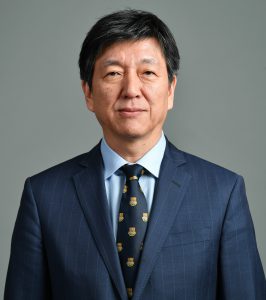President's Message
Greetings from the President

Nuclear energy must play a major role in achieving the challenging goals of ideal balance of economic and social development and the realization of a carbon-neutral society. However, contemporary public concerns on the nuclear energy is negative and critical. Our past activities might not be satisfactory to firmly convey the value of nuclear technology. Nuclear power is not just a technology for energy production. It is also a technology for individuals’ well-being and good quality of life. The radiation and beam technology are indispensable for realizing the affluence of people's lives, such as medical treatment and/or diagnosis, cancer treatment, and industrial and agricultural applications. It is necessary to deliver the usefulness of the nuclear science and technology so that the nuclear energy is accepted and safely used in the society. It should be noted, at the same time, that we must neither forget nor neglect the experience and lessons of the serious situation brought about by the Fukushima Daiichi Nuclear Power Station (NPS) accident. The Atomic Energy Society of Japan (AESJ) is responsible for leading and supporting the activities. The AESJ needs to be vitalized and activated to fulfill the responsibility.
The Atomic Energy Society of Japan held a symposium in 2019 on the 60th anniversary of the foundation. We designated the next decade as "a period for a reconstruction to restore the trust in nuclear energy and open up a new future." In March 2021, we held a symposium that memorizes 10 years after the accident at the Fukushima Daiichi NPS. In the symposium what we did in the past decade and where we will go in the future were openly discussed. The follow-up activities regarding the lessons and recommendations of the Accident Investigation Committee of the AESJ were reviewed. Accordingly, the issues that the AESJ should work on are identified as follows: dialogue and communication with social communities and other academic fields, promotion of safety research and provision of new knowledge, having more opportunities for exchange of opinions, fostering and educating human resources. Expected activities are making recommendations to the national energy policy, dissemination of knowledge and information to public, support to Fukushima Daiichi NPS decommissioning and regional reconstruction and recovery. In short, it is necessary to rebuild the future vision of the nuclear, to have input from various stakeholders, and to send important and essential messages to the society.
Based on the understanding mentioned above, I would like to realize the following three specific goals to be focused on in this term.
An academic society is not only a scholastic community that develops and improves expertise, but also a place for exchanging and conveying experts’ knowledge to society to deepen mutual understanding. Academic activities are promoted by the annual and fall conventions, 19 divisions and research committees inside the AESJ as well as many domestic and international symposiums. However, social activities such as outreach are not well functioning. To reinforce good communications between the AESJ and citizenry, a new workable framework to exchange idea and opinions are needed.
Second, for the sustainable development of the AESJ, we must put a break on the decrease in membership. Currently, the number of members is decreasing by 100 to 200 every year. We should change the downward trend. It is necessary to convey the attractiveness of nuclear science and technology to the younger generation and the outside the AESJ community. The priority should be placed on the explanation how we devoted ourselves to make sure the nuclear safety and nuclear risk is adequately managed. Also, we need to talk proper knowledge of radiation safety in an easy-to-understand manner. It is necessary to be free from the mindset that an academic society is a community of the experts. It is a place for meeting and communicating with people who are interested in energy and nuclear issues. It will broaden the basis of the membership. The openness of the academic society attracts every stakeholder.
Finally, we need to pursue ideal ways of academic society activities under COVID-19 circumstances. For the past years, we have been too defensive and exploring how to conduct academic activities in the difficult environment. From now on, it is important to propose an effective and productive way to get along with the tough situations in a proactive manner. We can take advantage of online communication. It is much easier to take a peek at an event or a symposium online. Audience feel free to access to the events, to join discussions, and to ask questions via internet. It will widen communication and dialogue channels.
Nuclear continues to be an attractive technology in the future. The proposals mentioned above are efforts to encourage the participation of citizenry, to make the AESJ an organization with real openness. I am convinced that it will lead to the revitalization and sustainable development of the AESJ. I conclude my message by saying my sincere gratitude and asking your strong support.
- Shinichi Nakayama, Japan Atomic Energy Agency
- Shinichi Kawamura, Hitachi-GE Nuclear Energy,Ltd.
- Yuichi Niibori, Tohoku University
